When I first started managing social media for a client’s clothing brand years ago, I thought I had everything under control. I was consistently posting engaging content, responding to comments, and running successful campaigns.

But one day, I woke up to find my brand's name trending on Instagram for all the wrong reasons. A dissatisfied customer had posted a scathing review of our latest product, and it had gone viral overnight. I realized that I’d been so focused on creating content that I’d neglected to keep a pulse on the broader conversations happening around my brand.
That experience taught me the importance of social listening – the practice of continuously tracking your brand's social media channels and looking out for any red flags.
In this post, we'll cover:
- What is social listening?
- Social Listening vs. Social Monitoring
- How does social media listening work?
- 4 Reasons to Start Using Social Listening
- How to Start Social Media Listening
- Social Listening Tips
- Social Listening in Action
- 5 Social Listening Tools to Use
- Listen to Your Audience with These Tools
What is social listening?
Social listening is the monitoring of your brand's social media channels for any customer feedback and direct mentions of your brand or discussions regarding specific keywords, topics, competitors, or industries, followed by an analysis to gain insights and act on those opportunities.
Customer service social listening is different from that of marketing as your goal is to better service your customers through understanding how they’re speaking about your product or service online, responding to customers that directly mention you, and collecting feedback that can help you update your processes to better serve your customers.
Social Listening vs. Social Monitoring
Social listening has a broader scope than social monitoring. With social listening, you're tracking brand mentions, customer feedback, industry trends, and more. However, social monitoring has a narrower focus on specific campaigns or keywords.
Social monitoring refers to keeping track of what people are saying directly to or about your brand on social media. You’re always listening for any time someone mentions your company's name or sends you a message. This helps you respond to any questions, comments, or concerns your customers might have.
For example, let‘s say I run a small bakery. I would use social monitoring to watch for any posts or comments that mention my bakery’s name or social media handle.
If someone posts on X, “I just had the most amazing cupcake at @MyBakery!” I can jump in and reply with a quick “Thank you!” to show my appreciation and engage with my customer.
On the other hand, social listening tracks and analyzes the bigger conversations happening around your industry or related topics, even if they don't mention your brand directly.
Going back to my bakery example, I might use social listening to track discussions about popular dessert trends, like “vegan donuts” or “gluten-free cookies.” By seeing what people are excited about, I can get ideas for new recipes to try or ways to adapt my menu to better meet my customers' needs and preferences.
So, while social monitoring helps me engage with my customers directly and provide great customer service, Social listening gives me actionable insights to help me make my business better.
How does social media listening work?
Social media listening works by using tools and software to monitor and analyze online conversations happening across various social media platforms, blogs, forums, and other websites. These tools track mentions of specific keywords, phrases, brands, or individuals, providing valuable insights into what people are saying and how they feel about certain topics.
Here's a breakdown of how it works:
- Keyword identification: You identify relevant keywords, phrases, or hashtags. These could be brand names, product names, industry terms, or competitor names.
- Data collection: Social media listening tools crawl through X, TikTok Instagram, and beauty blogs, collecting posts and comments containing these keywords.
- Data filtering and categorization: The tool filters the collected data to remove irrelevant information. The tool then categorizes the relevant mentions based on sentiment (positive for the tweet, negative for the comment), platform (Instagram, blog), and topic.
- Analysis: With the tool’s help, you categorize the data to uncover trends. This can include sentiment analysis to understand the overall sentiment towards a brand or product, topic analysis to identify trending discussions, and competitor analysis to compare brand performance.
- Reporting and action: The insights are compiled into a report. These reports help you understand customer feedback, identify potential crises, track brand reputation, and inform marketing and product development strategies.
This way, social media gives you raw data that you can translate into actionable insights to improve your products, marketing, and customer relations.
4 Reasons to Start Using Social Listening
In general, it's important to come to these conclusions because it promotes a customer-centric mindset in your company.
Why is social listening important for brands?
Rather than making assumptions about what your customers want or need, social listening helps you hear what they‘re saying. It’s common for people to share their opinions publicly, so it's no surprise they do the same about the brands they interact with.
1. Customers like it when brands respond.
Customers want to feel heard on social media. According to research by Sprout Social, 46% of consumers think that engaging with your audience on social media is what makes a brand best-in-class online.
In fact, being responsive on social media makes a difference; according to Sprout Social research, “By prioritizing responsiveness and relevance on social, marketers can positively influence consumer behavior to benefit the entire organization.” When consumers follow brands on social media, 90% are likely to make a purchase.
They want you to respond. But, it‘s more than that. It’s about using social listening to thoughtfully craft responses that provide real value. Those are the kinds of responses that will elicit brand loyalty and increase customer retention rates.
2. You can keep track of your brand's growth.
Brands sometimes face scandals or serious issues. It happens, unfortunately, but even one incident can cause a wave of negativity to plague your social media. It’s easy to ignore a few rude comments here and there, but an increase in negative comments can signal that something is wrong.
If that were to happen, it would be a great opportunity to use social listening. By analyzing the incident, you can understand the root cause and determine the type of response your business should make.
3. You can discover new opportunities.
Your customers will often do the work for you when it comes to identifying issues, whether that be with your product or service or your business processes. When you use social listening, you’ll come across customer conversations that outline any issues they’ve been having and what they think about your business overall. Your customers will also often say how they want their problems solved, giving you a leg up in ensuring that the changes you make speak directly to your customers' desires.
For instance, maybe you work in a fitness center, and your customers have been sharing their frustrations with classes filling up quickly. There is an opportunity for you to consider creating more classes, opening up more spots in each class, or limiting how many classes an individual can sign up for in a week.
Regardless, you’ve taken direct responses from your customers to help you update an aspect of your business process to better satisfy and meet their needs.
4. You can increase customer acquisition.
Social media offers many opportunities to reach prospects. After all, your followers aren’t just your loyal customers; they’re also people who enjoy your content. These are the kinds of people you should be targeting.
Inbound marketing highlights the importance of providing interesting, useful content that provides value to people. This initially attracts them to your brand and prevents you from being forced to bombard them with distracting ads. It’s much easier to convert your content viewers and followers into leads and, eventually, customers than it is to approach random strangers and hope they’ll be interested in your products or services.
How to Start Social Media Listening
Social Listening Tips
- Identify pain points.
- Choose strategic keywords and topics to monitor.
- Use it to improve your customer feedback process.
- Generate leads by following recommendation posts in your industry.
1. Use a social media listening tool.
A social listening tool like HubSpot allows you to set up keyword monitoring streams so you can surface critical interactions, and trigger email alerts to relevant teams like Sales when people mention a specific keyword.
Social listening tools eliminate the tediousness of manually searching for mentions and keywords across various social media platforms. They automate the process and notify you of any relevant mentions.
Testing it out
When I first started using HubSpot's social media listening tool, I was amazed at how much time it saved me. To test it out, I acted as the brand representative for skincare brand La Roche Posay. I created monitoring streams for the brand name, popular product names like “Toleriane” and “Effaclar,” and relevant industry keywords such as “sensitive skin,” “acne-prone skin,” and “sunscreen.”
2. Choose strategic keywords and topics to monitor.
Social listening can become a lot easier if you choose strategic keywords and topics to monitor continuously. They should be related to your business to ensure you get the most relevant information, and they might also evolve as time goes on and your business practices change.
For example, you can monitor your direct mentions, but most consumers on social media don’t directly mention a business, so you could track your product name. Social listening tools (which we’ll cover below) can help you track your preferred keywords, as well as help you uncover trends and topics that are being discussed in your industry.
Testing it out
When setting up social media listening for La Roche-Posay, I carefully selected a range of strategic keywords and topics to monitor. I started with the brand name and popular product names, such as “La Roche-Posay,” “Toleriane,” “Effaclar,” and “Anthelios.”
Next, I added industry-specific terms like “skincare,” “beauty,” and “dermatologist recommended,” as well as common skin concerns that La Roche-Posay products target, such as “sensitive skin,” “acne-prone skin,” and “anti-aging.”
To gain insights into customer preferences and trends, I also included keywords related to popular ingredients, such as “niacinamide,” “ceramides,” and “SPF.”
Finally, I set up monitoring for La Roche-Posay's main competitors, such as Cerave, Cetaphil, and Aveeno, to stay informed about their social media presence and customer sentiment.
3. Identify pain points.
Use social listening to understand gaps in your industry or product, as well as what's bothering your audience.
Aleh Barysevich, an expert digital marketer, says, “Social monitoring and listening tools break down the sentiment, reach, demographics, and user behavior trends behind any phenomenon you want to research on social media.”
After all, the best way to figure out your audience's problems is to hear from them directly. Social media users often talk about their pain points, so social monitoring will help you see if there’s a gap in what you’re offering that you can address to further satisfy your customers.
Testing it out
As I monitored social media conversations related to La Roche-Posay, I started to notice a recurring pain point among customers. Many people were expressing confusion about which products were best suited for their specific skin concerns, such as acne, sensitivity, or signs of aging.
I compiled these mentions and analyzed the common questions and concerns that customers had. I found that while La Roche-Posay offered a wide range of products, there was an opportunity to improve the way they communicated the benefits and target audience for each product.
4. Use it to improve your customer feedback process.
A key reason businesses use social listening is to respond to customer feedback and get a sense of customer feedback, whether negative or positive. So, when you do listen, it’s important to use the information you get to improve your customer service processes.
For example, if people constantly complain about long wait times, whether from your business or in customer service, you can make it a goal for your business to lower response times and quickly resolve customer issues.
Case in point: Notion uses social listening to address issues customers face with the app.
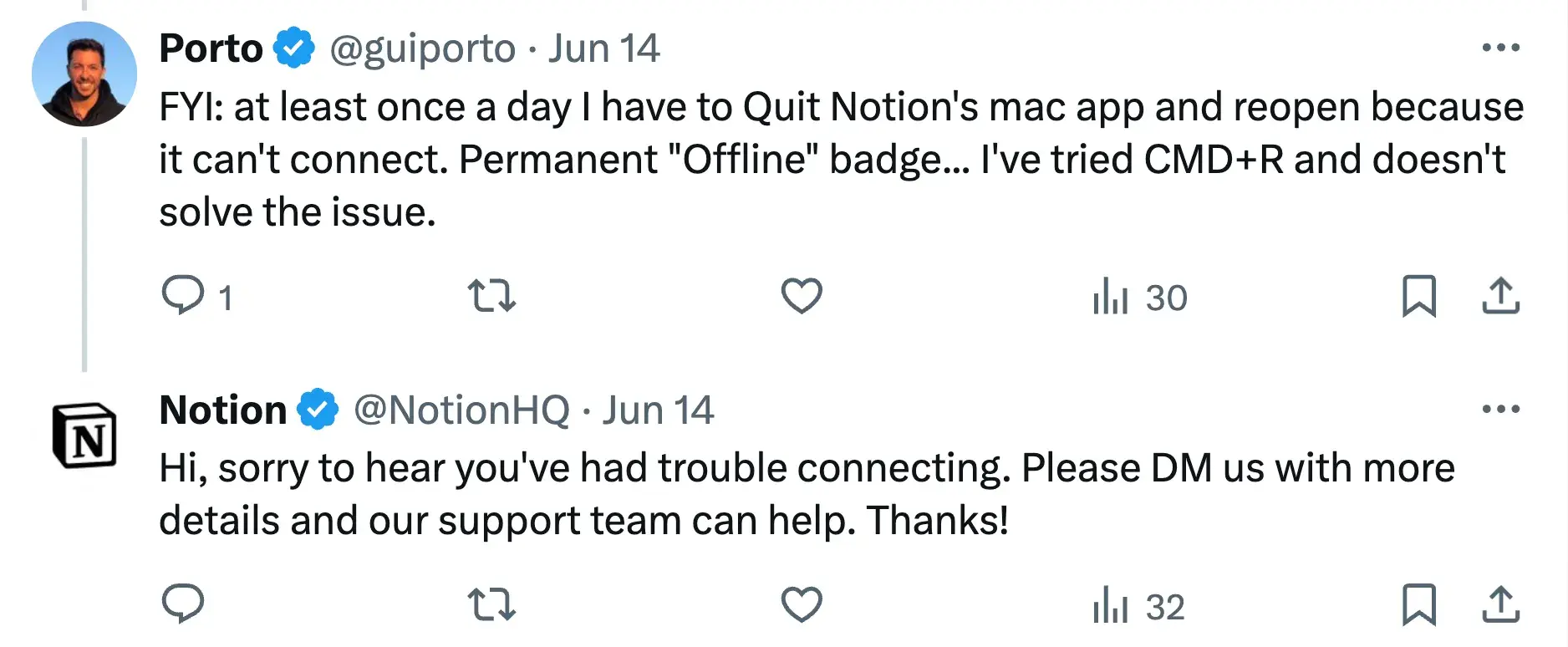
This way, the team keeps a pulse on any problems that may arise.
And it works well. A recent survey by Social Intelligence Lab found that 89% of respondents rate the quality of the data they have access to from social listening as high or very high, so listening to customers gives you trustworthy information about what you should do.
Testing it out
To see how social listening could improve La Roche-Posay's customer feedback process, I monitored mentions of the brand across various social media platforms. I noticed a pattern of customers expressing frustration with the company’s delivery packaging.
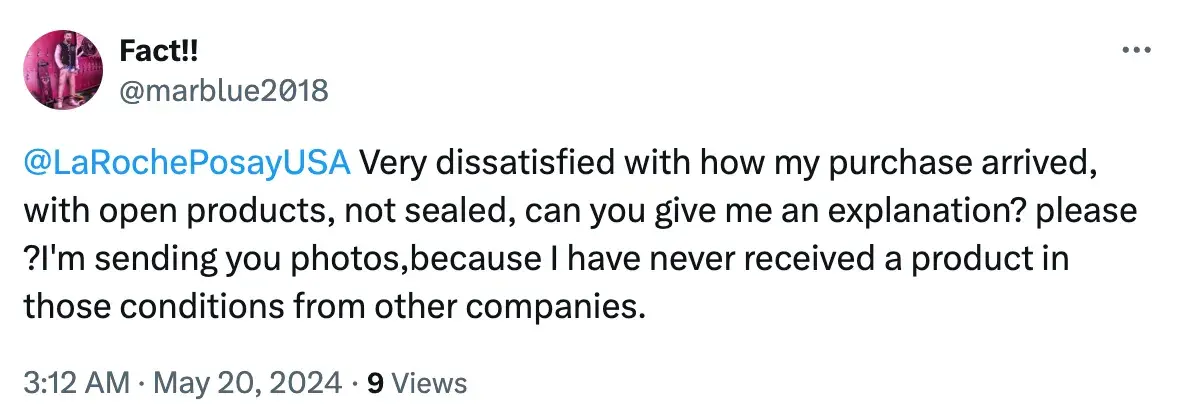
Understanding that customers were concerned about the safety and hygiene of their products, La Roche-Posay can convey these insights to the relevant teams so they can improve their processes.
5. Generate leads by following recommendation posts in your industry.
With social listening, you can engage with your audience. Barysevich adds, “You can use social listening, competitor, and hashtag research to find accounts related to your niche and engage them in the comments. Then, offer your expertise or start conversations discussing relevant topics.”
For example, follow “recommendation” posts in your industry. You can then respond by offering tips and recommending your product where it makes sense.
If these seem a bit conceptual, let's dive into the step-by-step process you can use to implement a social listening strategy.
Testing it out
I came across an Instagram post from a beauty influencer discussing how to determine your skin type. The post had many comments from followers asking for advice.

I saw this as an opportunity for La Roche-Posay to demonstrate its expertise.
On behalf of the brand, I could craft a comment providing a step-by-step guide on identifying skin types and recommending specific La Roche-Posay product lines for each type. By offering valuable information and subtly showcasing its products, the brand could generate leads, increase awareness, and position itself as a helpful resource for skincare advice among the influencer's engaged audience.
Social Listening in Action
To really do a deep dive with social listening and see all of the reactions and brand implications, you need to take a look at your personas and business goals. Let's get started.
1. Know your personas. Who are you trying to attract? What social media platforms do they use?
2. Determine the objective of the search. There is too much data to just jump into it.
- Are you planning to launch a product and want to know if there's interest?
- Are you searching to see what current customers are saying (customer service opportunity)?
- Want to see how you stack up against your competition?
- Want to know who you're really competing with for your business?
- Have a product or service and want to know how to optimize it? Listen for customer feedback.
- Are people talking about you at all? Do you need to strengthen awareness efforts?
3. Make a list of the keywords you specifically utilize for your social media/brand.
4. Make a list of keywords associated with your industry (this will help you find and see competitors).
5. Create guidelines for how far back you will go back to look for comments/interactions.
6. Make a spreadsheet with your findings. Depending on the comment, how can this be improved?
7. Have guidelines for how findings are handled.- How will you respond to bad comments/reviews?
- How do you show your support for positive comments/reviews?
- How do you respond when others talk about your competitors in a favorable light?
- How do you respond to your competitors when people say negative things about them? (See how Wendy‘s handled McDonald’s Black Friday Tweet Fail.)
- When and where do you use your branded hashtag(s)?
- You need to respond in a timely fashion. Also, don't just respond to the negative. When a customer praises you, they are saying, “I love you.”
- Address their concerns by acknowledging that there is a problem, you hear them, and want to resolve it.
- Invite them to pull the conversation off social by contacting you through DM, email, phone, etc.
- What content are people responding to?
- Are you seeing new followers after using specific keywords?
- Are there specific topics that your audience engages with most?
- When you recycle any of your content, do you see similar engagement?
Social listening tools will help you analyze the results of your process.
What are social listening tools?
Social listening tools help your customer service team monitor the channels you use for conversations about your business, product, or industry, whether you’re directly mentioned or not.
Many tools have one inbox, so you can seamlessly monitor all channels in one dashboard and allow you to reply to direct mentions to ensure you’re helping customers in a timely manner. Below we’ll recommend four high-quality social listening tools to consider.
5 Social Listening Tools to Use
1. HubSpot
HubSpot’s social media management software helps you prioritize your social interactions and connect with the right people.
The Social Monitoring Streams help me create custom streams to track specific keywords, hashtags, or brand mentions across multiple social platforms. This helps me stay on top of relevant conversations and engage with my audience in real time.
I also find HubSpot's Social Inbox incredibly useful for managing social interactions. It consolidates all incoming messages and mentions from various platforms into a single inbox, so I can easily respond, prioritize, and never miss an opportunity to connect with my audience.
2. Lately
Lately is an all-in-one solution for social media marketing professionals and teams that starts with writing your social media posts for you. One of my favorite features is the A.I. Content Writing software. It learns from my past posts and suggests copy that genuinely resonates with my audience.
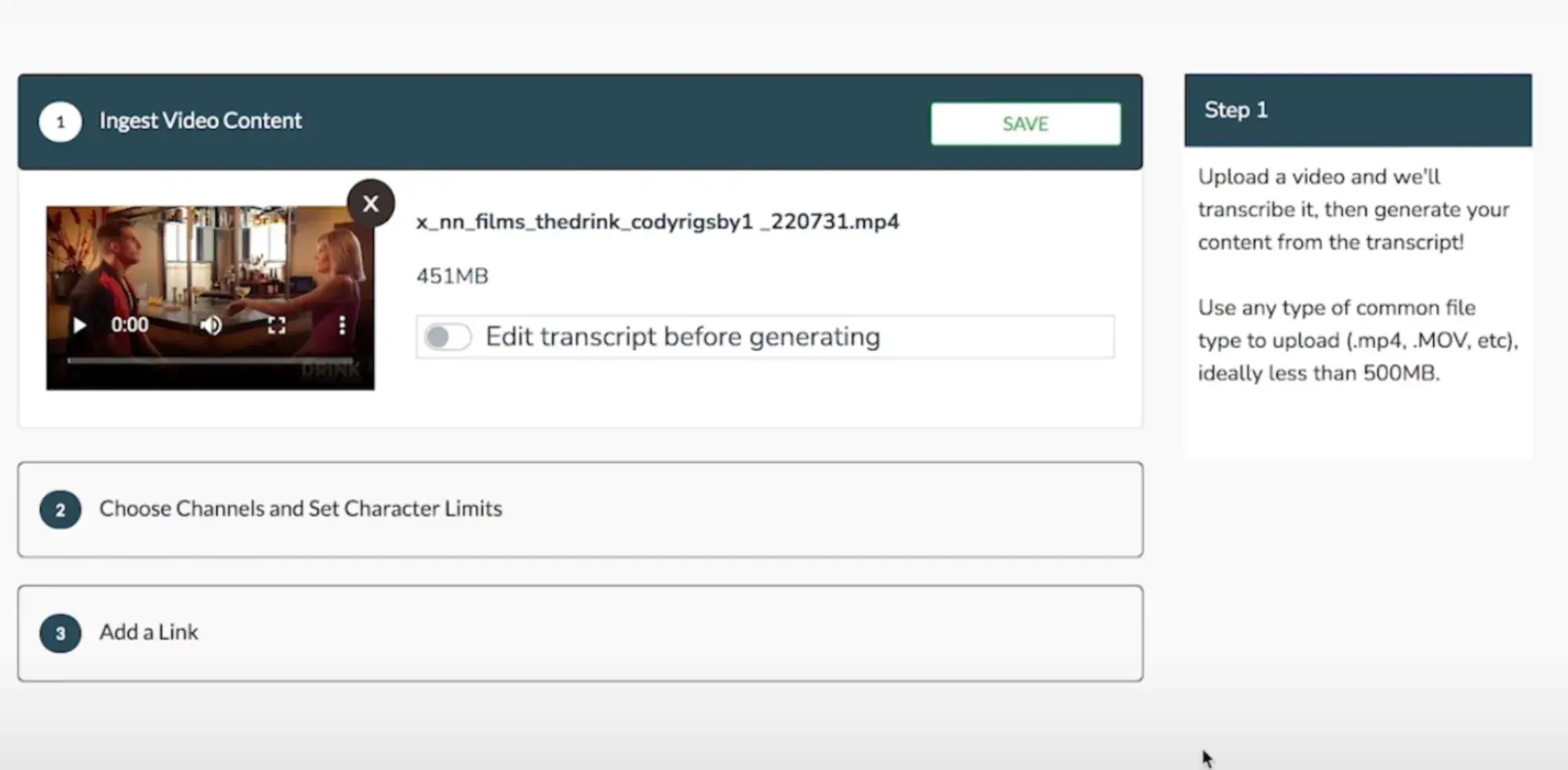
Lately also offers a suite of tools that let me review, edit, and approve the AI-generated content, schedule posts across all my channels, and track performance with detailed social media reports.
I'm particularly impressed with the social listening capabilities, which help me stay on top of what my audience is saying and engage with them in real time.
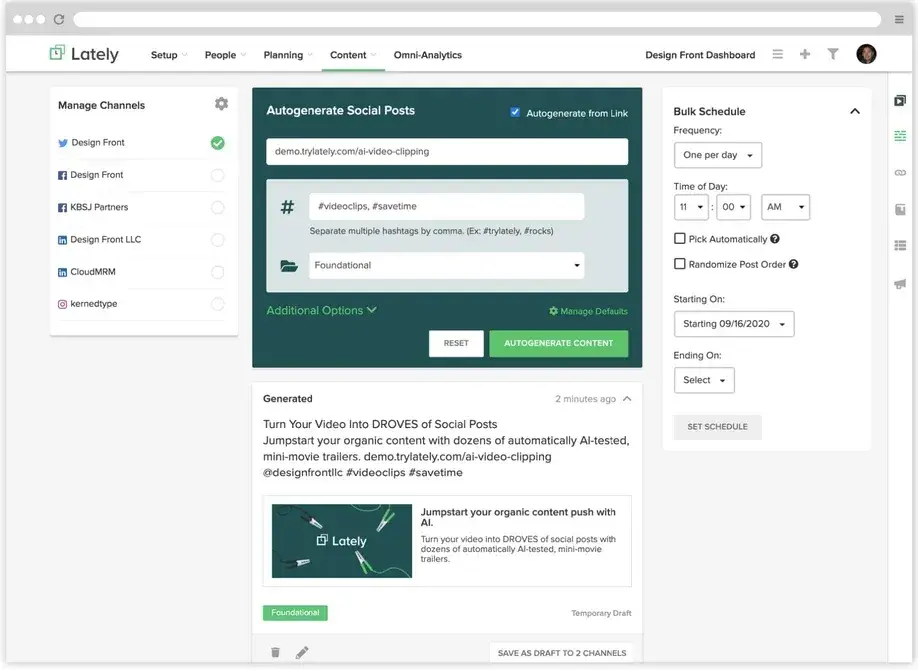
3. Sprout Social
Sprout Social offers social media management software that will improve your social media interactions with customers and prospects. Its key social listening features include a Twitter Listener dashboard to analyze your Twitter presence, real time brand monitoring to track direct mentions and brand-relevant keywords, and advanced social listening to help you uncover emerging trends and influencers.
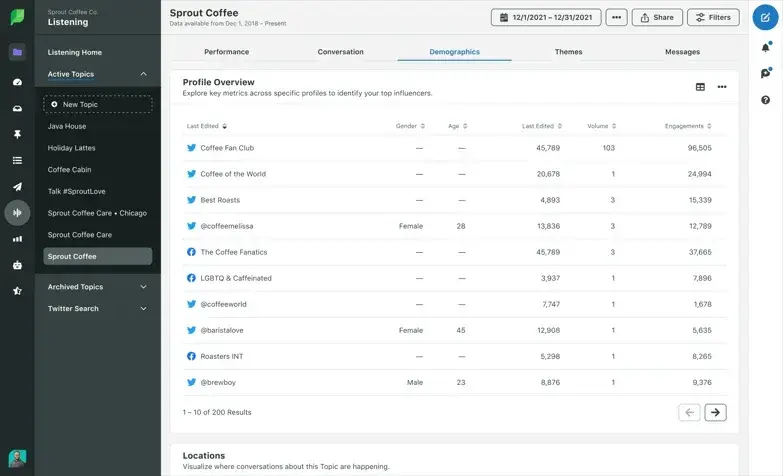
One of my favorite features? The word cloud. It visualizes the key terms that dominate the conversation so I can spot emerging trends, popular topics, and important themes that resonate with my audience.
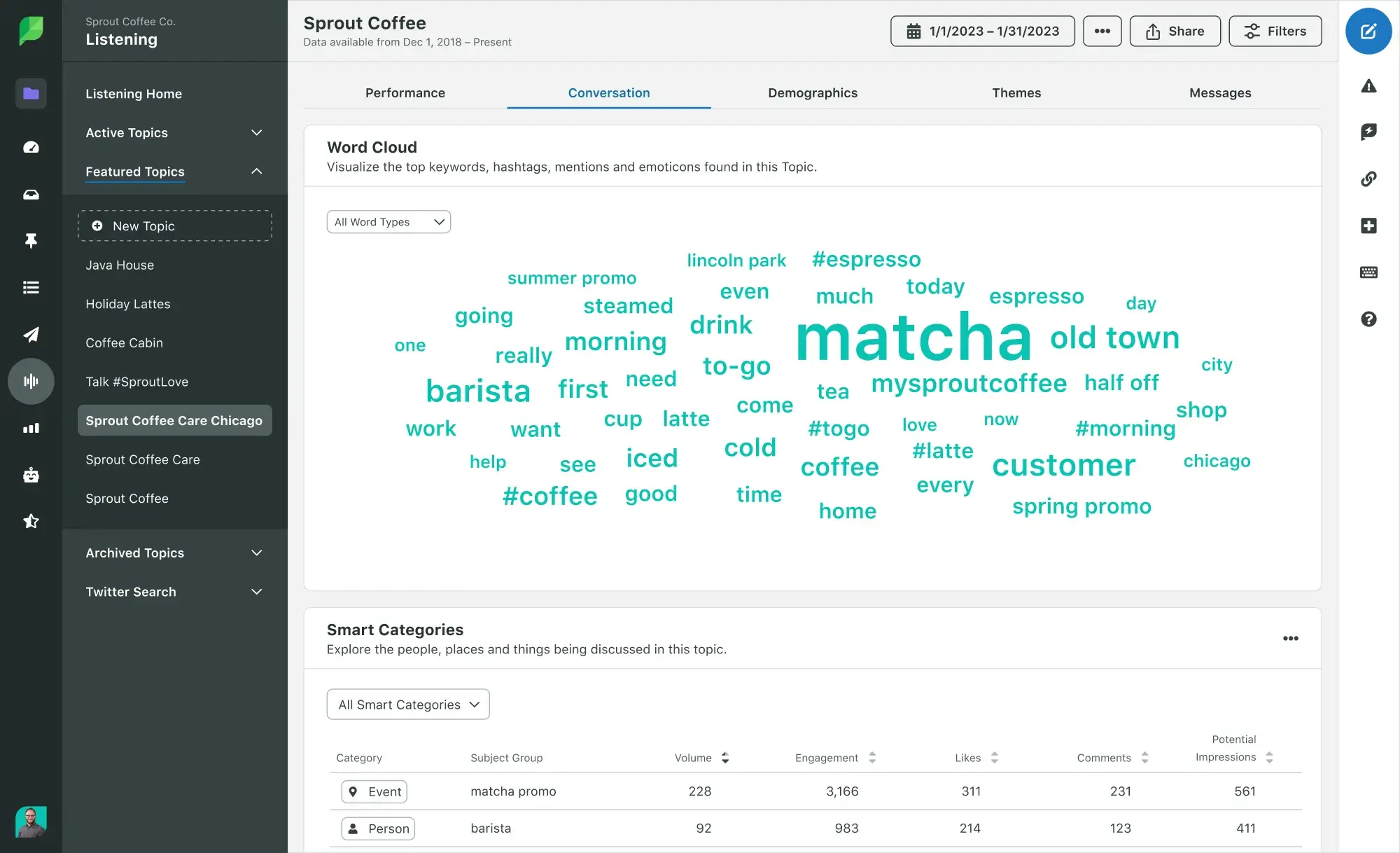
I also find Sprout Social's sentiment summary feature incredibly useful for gauging the overall tone and emotional response to my brand.
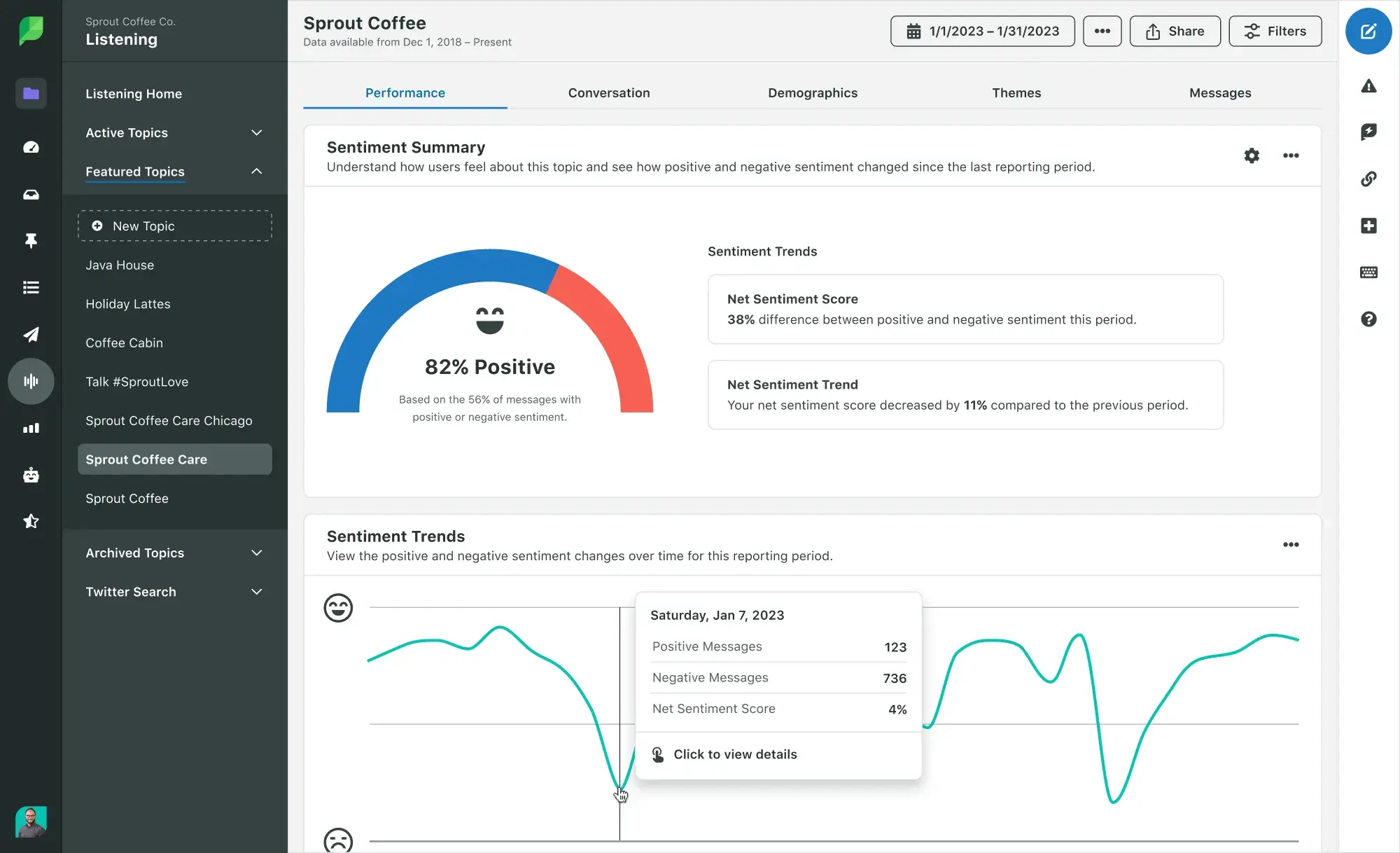
A breakdown of positive, negative, and neutral mentions helps me assess the general perception of my brand and identify any potential issues or opportunities that may require my attention.
4. Digimind
I've found Digimind to be a powerful social listening and market intelligence platform that helps me stay on top of online conversations. I'm particularly impressed with its ability to analyze massive amounts of data from various sources across 20+ media types, including Facebook, Instagram, TikTok, and Twitter.
I find Digimind's Historical Data incredibly valuable. Digimind lets me dig into two years of social media conversations — essential for understanding long-term trends and measuring the impact of my campaigns over time.
I can also create personalized dashboards that display the exact metrics and insights that are most relevant to my goals, making it easy to stay on top of the data that matters most to my brand.
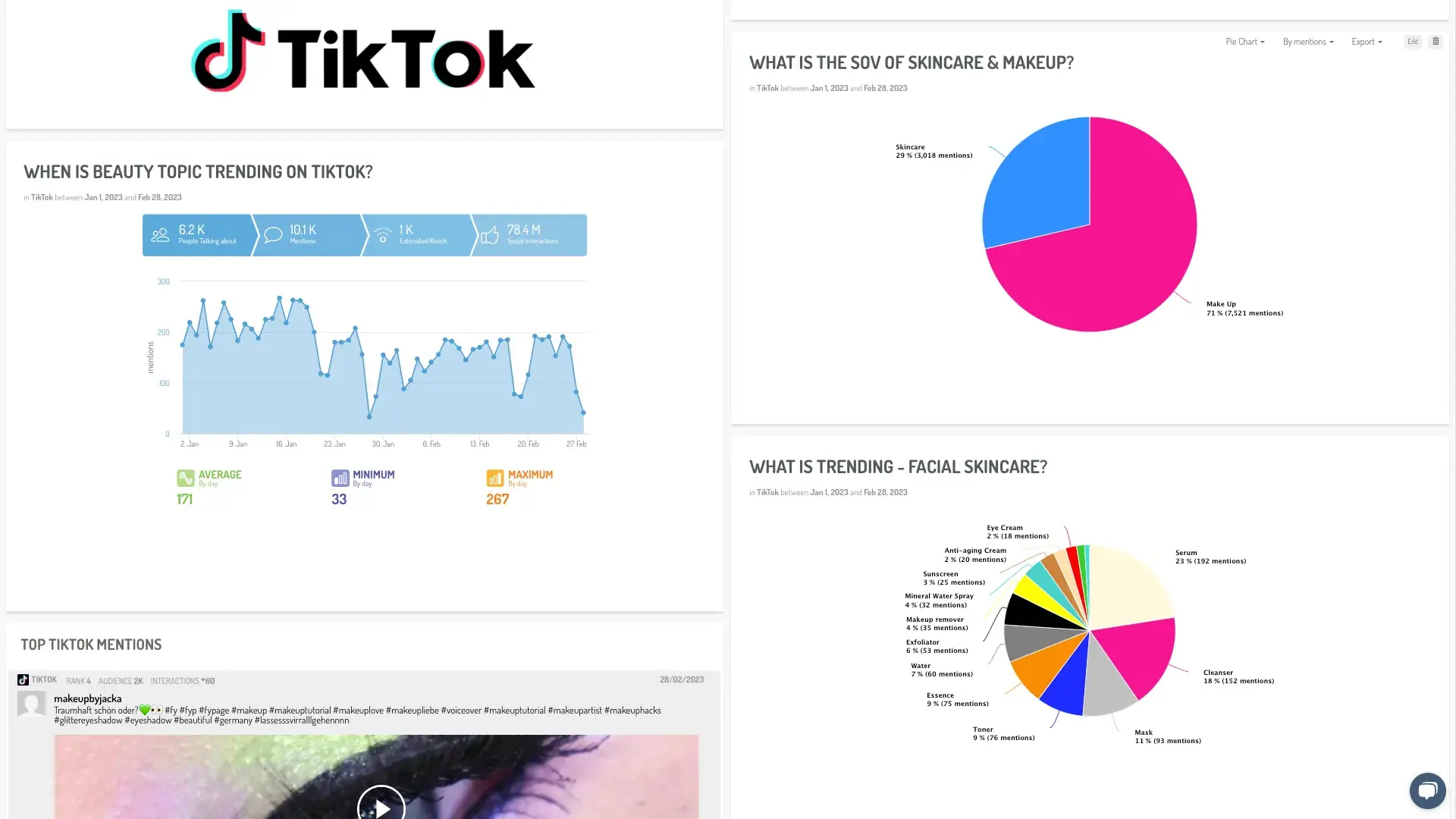
5. Hootsuite
Hootsuite’s social media marketing and management dashboard helps you build and grow relationships with your social media followers.
Streams allow me to monitor mentions, keywords, and hashtags in real-time across multiple social media platforms.
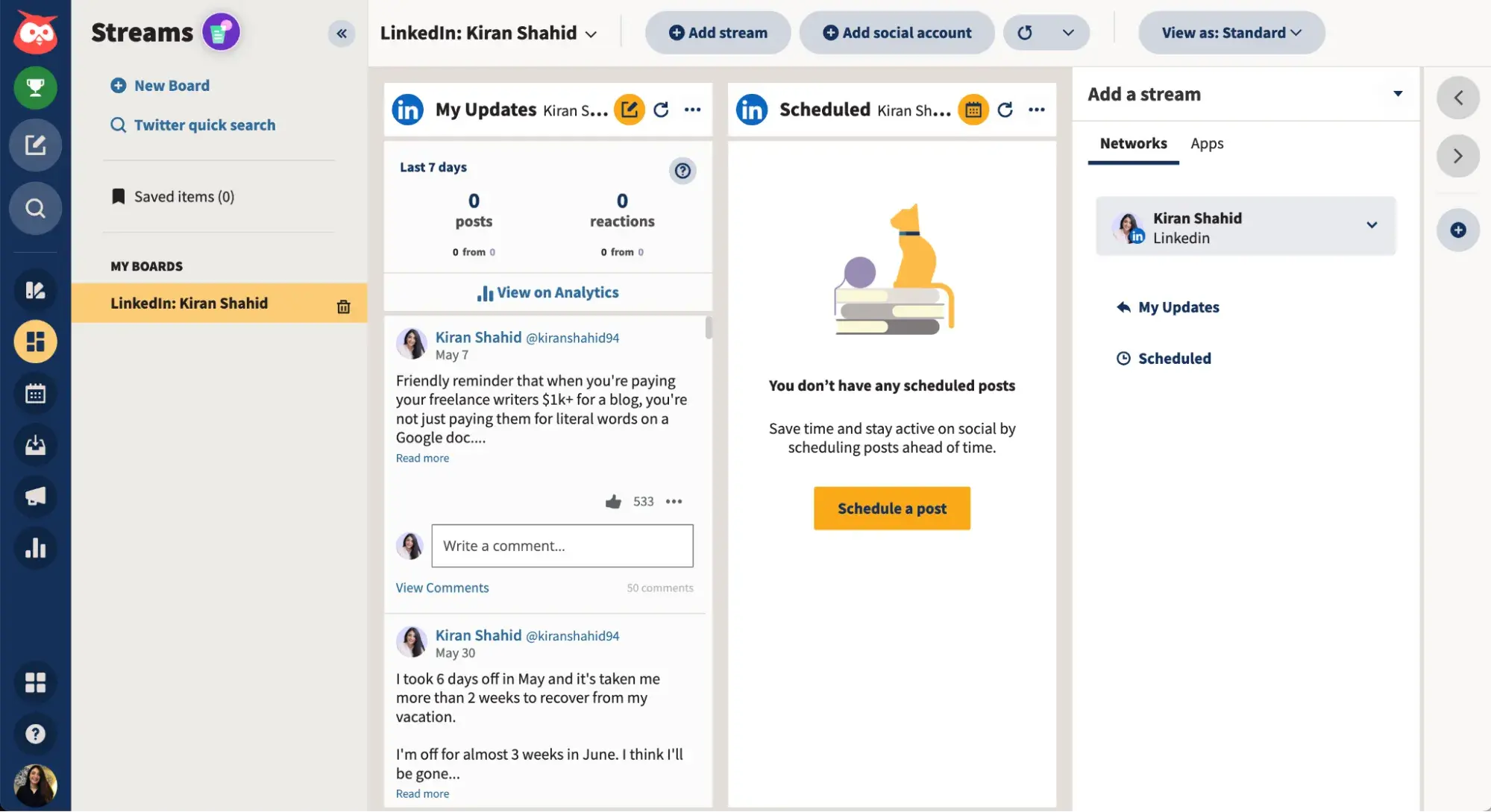
I can stay on top of the conversation and engage with my audience promptly.
One of the most exciting features on the horizon is Hootsuite x Talkwalker‘s AI-powered visual recognition. It’s the only tool that listens across video, memes, GIFs, audio, and more, so I can monitor references to my brand logo, scenes, and objects that traditional text-based listening might miss.
While this technology is a recent acquisition and not yet available across all plans, I'm eager to see how it changes my brand monitoring.
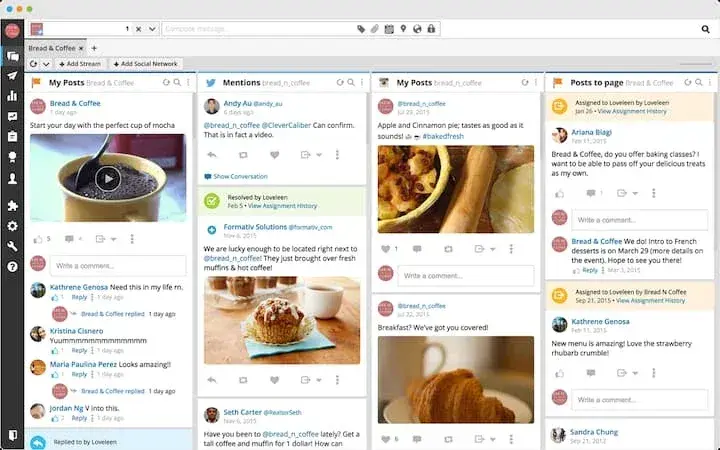
Listen to Your Audience with These Tools
Social media can indicate growing and shifting customer trends. If you don't pay attention and roll with the punches, your brand will falter among the brands that do.
As I reflect on the various social media listening tips and strategies, one stands out as the most crucial foundation: knowing your audience. Without a deep understanding of your target audience, all other efforts may fall short. Thorough audience research allows you to select the most relevant and meaningful keywords to monitor.
Your customers want a brand that is fresh and interactive and provides them with products, services, support, and content that are genuinely useful and engaging. With social listening and audience research, you can do that.
Editor's note: This post was originally published in August 2018 and has been updated for comprehensiveness.
![→ Access Now: Social Media Customer Service Template [Free Tool]](https://no-cache.hubspot.com/cta/default/53/07102c64-cd2f-4581-b6dc-0ee62a108842.png)
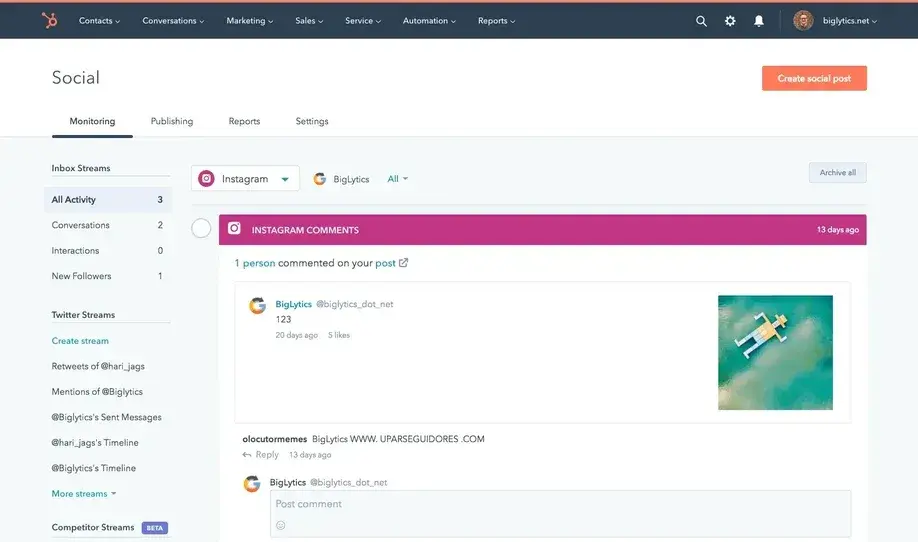




![More Brands Are Using Social Media Messaging for Service, but Are Consumers Interested? [New Data]](https://www.hubspot.com/hubfs/social%20DMs%20for%20service_featured.jpg)





